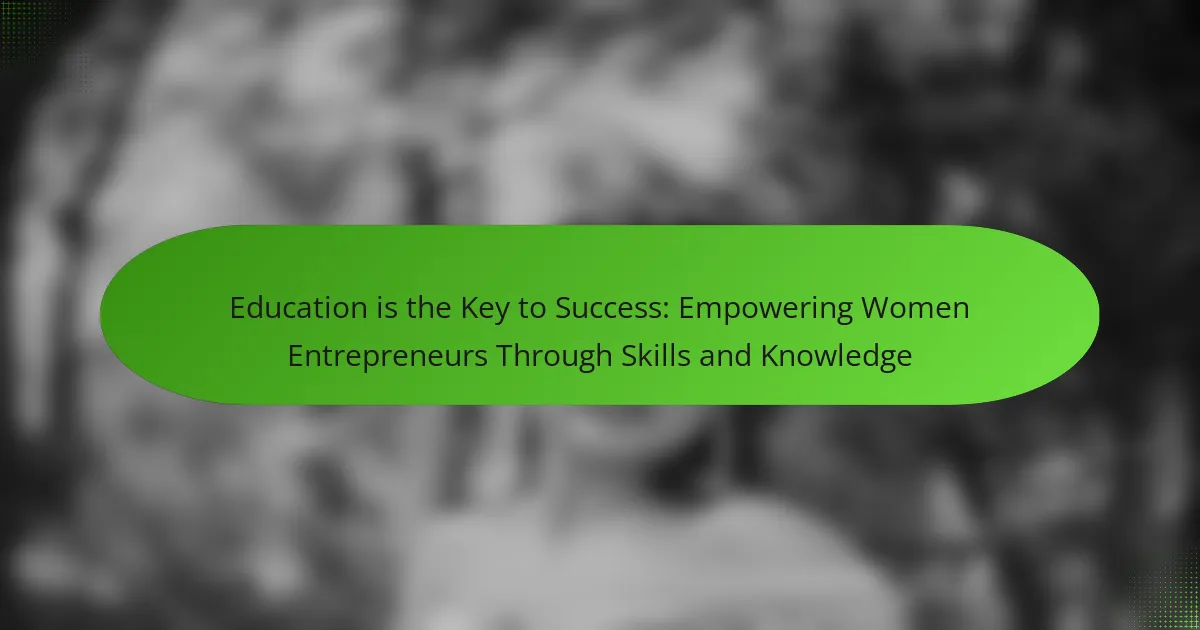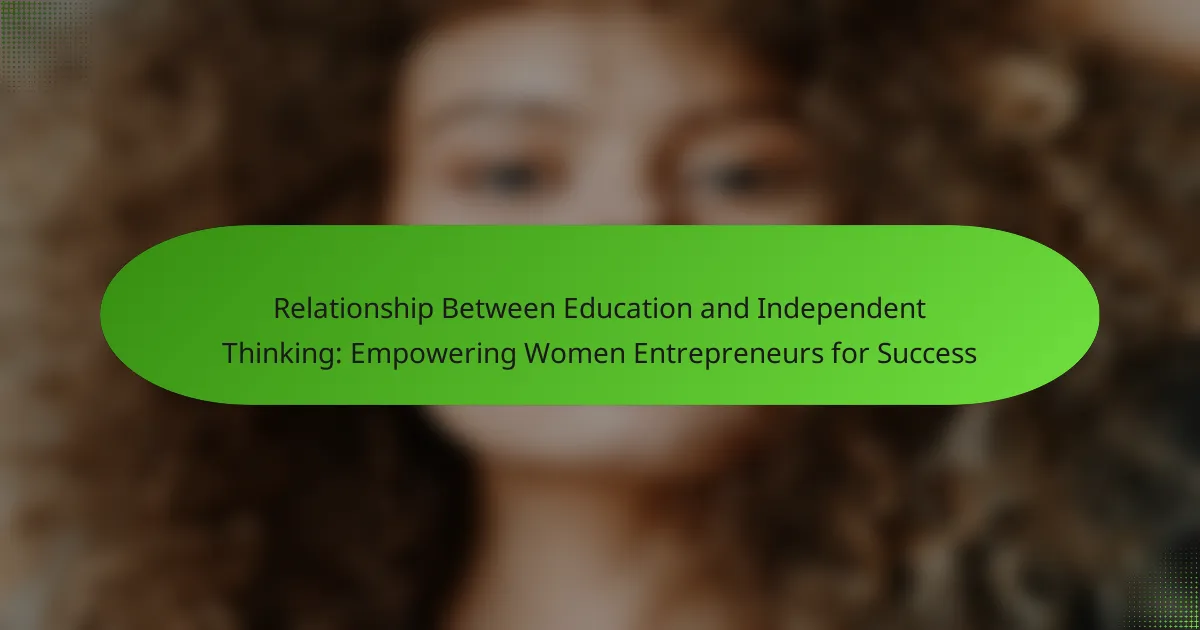Women entrepreneurs face unique challenges in balancing education with independent thinking. Education equips them with essential skills and confidence, while independent thinking fosters creativity and innovation. This article explores how both elements empower women to navigate business landscapes, the societal barriers they encounter, and the rare attributes that enhance their effectiveness. By leveraging insights from education and independent thinking, women can drive change and achieve greater success in their entrepreneurial journeys.

What is the Role of Education in Shaping Women Entrepreneurs?
Education plays a crucial role in shaping women entrepreneurs by fostering independent thinking. It equips them with essential skills, knowledge, and confidence to navigate the business landscape. Education enhances critical thinking, enabling women to make informed decisions and innovate effectively. Furthermore, it encourages networking and mentorship opportunities, which are vital for entrepreneurial success. Studies show that women with higher education levels are more likely to start their own businesses and sustain them over time. By emphasizing education, we empower women to challenge societal norms and pursue their entrepreneurial aspirations.
How Does Formal Education Impact Business Skills?
Formal education enhances business skills by providing structured knowledge, networking opportunities, and credibility. Women entrepreneurs benefit from this foundation, gaining confidence and strategic insights. Research indicates that educated women are more likely to start successful businesses, as education fosters critical thinking and problem-solving skills. Additionally, formal education often leads to mentorship, which is crucial for navigating challenges in entrepreneurship.
What Are the Limitations of Traditional Education for Entrepreneurs?
Traditional education often limits entrepreneurs by emphasizing conformity over independent thinking. This approach stifles creativity and innovation, crucial for entrepreneurial success. Additionally, traditional systems may not address the unique challenges women entrepreneurs face, such as balancing societal expectations and business demands. Moreover, the rigid structure of conventional education can hinder the development of adaptive problem-solving skills. Finally, reliance on standardized testing fails to measure the entrepreneurial mindset, which values risk-taking and resilience.

What is Independent Thinking and Why is it Essential for Women in Business?
Independent thinking empowers women in business by fostering creativity and innovation. Unlike traditional education, which often emphasizes rote learning, independent thinking encourages critical analysis and problem-solving. This mindset enables women entrepreneurs to navigate challenges and seize opportunities effectively. Research shows that businesses led by independent thinkers tend to outperform their competitors in adaptability and growth. Furthermore, cultivating independent thinking can enhance decision-making skills, leading to more confident leadership. By prioritizing independent thought, women can drive change and inspire others in their professional journeys.
How Can Independent Thinking Foster Innovation?
Independent thinking drives innovation by encouraging unique solutions and creative problem-solving. It empowers women entrepreneurs to challenge norms and explore unconventional ideas. This mindset fosters resilience and adaptability, crucial traits in a competitive market. Independent thinkers often identify opportunities others overlook, leading to groundbreaking ventures and advancements.
What Are the Characteristics of Independent Thinkers in Business?
Independent thinkers in business exhibit traits like creativity, resilience, and a willingness to challenge norms. They prioritize innovative problem-solving and embrace diverse perspectives, which can lead to unique business strategies. This mindset empowers women entrepreneurs by fostering confidence and encouraging risk-taking. Additionally, independent thinkers often possess strong critical thinking skills, enabling them to make informed decisions that drive success.

What Are the Universal Benefits of Combining Education and Independent Thinking?
Combining education and independent thinking fosters creativity and innovation, essential for women entrepreneurs. Education provides foundational knowledge, while independent thinking encourages unique solutions to challenges. This synergy enhances decision-making and problem-solving skills, leading to greater business success. Women entrepreneurs who embrace both can navigate complexities and seize opportunities effectively.
How Does a Balanced Approach Enhance Decision-Making?
A balanced approach enhances decision-making by integrating diverse perspectives and fostering critical analysis. This method empowers women entrepreneurs to evaluate options more effectively, leading to informed choices. By blending education and independent thinking, they gain unique insights that drive innovation and adaptability. Studies show that diverse decision-making teams outperform homogeneous ones, highlighting the value of varied viewpoints in achieving successful outcomes.
What Skills Can Be Developed Through This Combination?
Education and independent thinking foster critical skills in women entrepreneurs, including problem-solving, decision-making, and creativity. These skills enhance adaptability in dynamic business environments. Developing confidence through education empowers women to take calculated risks, while independent thinking promotes innovative approaches, driving business success.

What Unique Challenges Do Women Face in Balancing Education and Independent Thinking?
Women face unique challenges in balancing education and independent thinking, primarily due to societal expectations and institutional barriers. These challenges include limited access to resources, gender biases in educational settings, and a lack of mentorship opportunities.
Research indicates that women entrepreneurs often struggle to assert their independent thinking in male-dominated environments. This can hinder their ability to innovate and lead effectively. Additionally, balancing educational pursuits with personal responsibilities can lead to increased stress and reduced opportunities for skill development.
Empowering women through targeted educational programs that promote independent thinking can help mitigate these issues. By fostering environments that value diverse perspectives, women can thrive as entrepreneurs, enhancing their contributions to the economy.
How Can Societal Expectations Influence Women Entrepreneurs?
Societal expectations significantly shape the experiences of women entrepreneurs, often constraining their opportunities. These expectations can dictate roles, limit access to resources, and influence perceptions of competence. Women may face pressure to conform to traditional norms, which can hinder independent thinking and innovation. As a result, fostering an environment that encourages education and independent thought is crucial for empowering women entrepreneurs. This shift can enhance their confidence and decision-making abilities, leading to more successful ventures.
What Strategies Can Help Overcome These Challenges?
Empowering women entrepreneurs requires strategies that enhance independent thinking and education. Fostering mentorship programs can provide guidance and support. Encouraging networking opportunities helps build confidence and share experiences. Offering workshops on critical thinking strengthens decision-making skills. Creating access to resources promotes self-sufficiency and innovation.

What Rare Attributes Contribute to Successful Women Entrepreneurs?
Successful women entrepreneurs often possess rare attributes that enhance their effectiveness. These attributes include resilience, adaptability, and a strong sense of purpose. Resilience allows them to navigate challenges and setbacks, while adaptability enables them to pivot in response to changing market conditions. A strong sense of purpose drives their commitment to their vision and motivates others to join their cause. These rare attributes create a unique advantage, fostering innovation and leadership in their respective fields.
How Do Personal Experiences Shape Independent Thought?
Personal experiences significantly influence independent thought by fostering critical thinking and self-awareness. Women entrepreneurs often draw on their unique life experiences, which shape their perspectives and decision-making processes. These experiences provide valuable insights that challenge conventional education models, enhancing creativity and innovation. For example, women who navigate diverse challenges may develop resilience and adaptability, key traits for successful entrepreneurship. As a result, personal experiences empower women to think independently and approach problems from unique angles, ultimately driving their business success.
What Role Does Mentorship Play in Developing Unique Attributes?
Mentorship significantly enhances the unique attributes of women entrepreneurs by fostering independent thinking. It provides guidance, feedback, and support, which empower women to develop critical skills and confidence. Mentors can help identify and refine unique strengths, enabling entrepreneurs to navigate challenges effectively. This relationship cultivates innovative approaches and strategic thinking, essential for success in competitive markets.

How Can Women Entrepreneurs Apply These Insights for Success?
Women entrepreneurs can leverage insights from education and independent thinking to enhance their business strategies. By prioritising critical thinking, they can identify unique market opportunities and innovate effectively. Embracing lifelong learning fosters adaptability, allowing them to respond to industry changes. Networking with other entrepreneurs further enriches their perspective, promoting collaboration and shared knowledge. Additionally, incorporating feedback mechanisms helps refine their approach, ensuring continuous improvement and success.
What Are the Best Practices for Fostering Independent Thinking?
Encouraging independent thinking involves fostering a supportive environment, promoting critical analysis, and encouraging risk-taking. Women entrepreneurs can benefit from mentorship programs that emphasize self-reliance and decision-making skills. Providing resources for continuous learning and networking opportunities enhances their confidence and ability to think independently. Celebrating small successes reinforces their capability to innovate and leads to greater entrepreneurial resilience.
What Common Mistakes Should Be Avoided in This Journey?
Avoiding common mistakes is crucial for women entrepreneurs. Key pitfalls include neglecting independent thinking, relying solely on traditional education, and overlooking the importance of networking. Emphasizing self-confidence, seeking mentorship, and continuously adapting to market changes can empower women in their entrepreneurial journey.
How Can Networking Enhance Both Education and Independent Thinking?
Networking significantly enhances education and independent thinking by fostering collaboration and diverse perspectives. Engaging with others allows women entrepreneurs to share experiences, gain insights, and challenge conventional wisdom. This exchange of ideas cultivates critical thinking, essential for innovative problem-solving. Additionally, networking provides access to mentors and resources, empowering women to navigate challenges effectively. As a result, the synergy between networking and education promotes a more robust entrepreneurial mindset.



